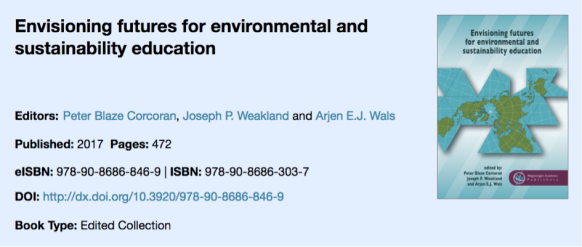
Last month the fifth book in the Wageningen Academic Publishers Series on Education in the context of Sustainable Development, that started almost 10 years ago with Social learning towards a Sustainable World, appeared. Envisioning Futures for Environmental and Sustainability Education invited educational practitioners and theorists to speculate on – and craft visions for – the future of environmental and sustainability education. The book, I co-edited with Peter Blaze Corcoran and Joe Weakland, explores what educational methods and practices might exist on the horizon, waiting for discovery and implementation. A global array of authors imagines alternative futures for the field and attempts to rethink environmental and sustainability education institutionally, intellectually, and pedagogically. These thought leaders chart how emerging modes of critical speculation might function as a means to remap and redesign the future of environmental and sustainability education today.
Previous volumes within this United Nations Decade of Education for Sustainable Development series have responded to the complexity of environmental education in our contemporary moment with concepts such as social learning, intergenerational learning, and transformative leadership for sustainable futures. ‘Envisioning Futures for Environmental and Sustainability Education’ builds on this earlier work – as well as the work of others. It seeks to foster modes of intellectual engagement with ecological futures in the Anthropocene; to develop resilient, adaptable pedagogies as a hedge against future ecological uncertainties; and to spark discussion concerning how futures thinking can generate theoretical and applied innovations within the field.
The future of environmental education is an urgent question in the larger context of the Anthropocene, the geological epoch in which human activities have become the dominant driver in the ongoing evolution of Earth’s biosphere. Our contemporary ecological moment is characterized by complexity, uncertainty, and ‘accelerating change’ (Wals and Corcoran 2012). While the global impact of anthropogenic climate change is undeniable, the pace of temperature and sea level rise depends on ecological feedback loops that are not fully understood – and which may be increasing the rate of biosphere destabilization (Hansen et al.2015). From a social perspective, the Anthropocene is an age of what humanities scholar Rob Nixon (2011) terms ‘slow violence,’ or ecological violence and environmental injustice that occurs on spatial and temporal scales that are hard to understand or represent, most often against the world’s poorest peoples. In light of such developments, educators need strategies for anticipatory engagement with changing socio-ecological realities – both in the present and future – in order to be effective within their various embodied contexts. This volume explores how environmental educators can engage in imaginative mapping concerning large scale global processes, as well as create useful, situated knowledge for dissemination within their respective socio-ecological contexts.
Keywords: sustainability education, environmental education, education, sustainable development, social learning, transformative leadership, intergenerational learning
The opening chapter is available here: introchapterenvisioningfutures for free as an open access publication or at the publisher’s website where the book can be purchased: http://www.wageningenacademic.com/doi/abs/10.3920/978-90-8686-846-9
